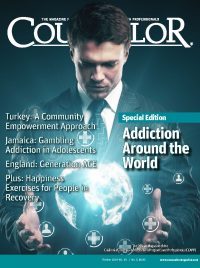Share
A person’s recovery from substance use and abuse is not lifelong and all-powerful; rather, it is something that individuals with proper support networks can manage. Having a supportive community network can help many people find additional strength, hope, and motivation to pursue a path of health and growth that will put their behavioral health challenges into a more manageable life process, resulting in less stress and anxiety (Peele, 1992; Peele & Brodsky, 1992). The college experience can serve as a healing source in students’ recovery processes by expanding their existing network of support and providing positive outlets that reinforce self-expression and awareness through coursework, peer and faculty relationships, and occupational exploration (DiRosa & Scoles, 2019). College recovery student life services should be viewed as a resource for information, friendship, and socialization for students. This supportive educational environment must be a place where self-determination and recovery transformation are nurtured and acknowledged, and through this transformative process, education can become integrated into values and principles of recovery and resilience.
About Me
Pascal Scoles, DSW, LCSW, is professor of behavioral health/human services and director of the Office of Collegiate Recovery at the Community College of Philadelphia. He received his doctorate in addictions and health from the University of Pennsylvania School of Social Policy and Practice, his MSW from Rutgers University, and his bachelor’s degree from LaSalle College in Philadelphia. For more than forty years he has been an educator, therapist, teacher, and consultant to treatment facilities, city and state governments, and the criminal justice system.
Francesca DiRosa, PhD, is assistant professor of behavioral health/human services at the Community College of Philadelphia, Pennsylvania.











 Counselor Magazine is the official publication of the California Association of Addiction Programs and Professionals (CCAPP). Counselor offers online continuing education, article archives, subscription deals, and article submission guidelines. It has been serving the addiction field for more than thirty years.
Counselor Magazine is the official publication of the California Association of Addiction Programs and Professionals (CCAPP). Counselor offers online continuing education, article archives, subscription deals, and article submission guidelines. It has been serving the addiction field for more than thirty years.